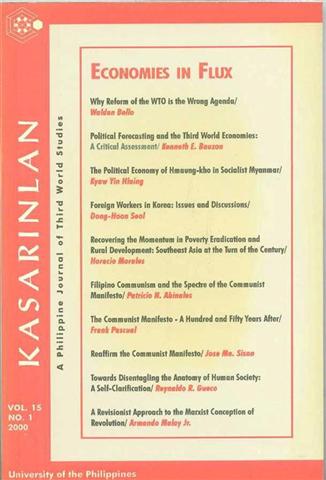Filipino Communism and the Spectre of the Communist Manifesto
Abstract
The Communist Manifesto and communism in the Philippines are like father and son who have grown apart. The Communist Party of the Philippines (CPP) declares itself a progeny of Marx and Engels and a faithful of proletarian internationalism but has since the 1970s dedicated itself to a less than global cause under a Maoist influence. While the CPP did adapt itself to local conditions, it was less prepared to handle the changing political economy as well as the alteration of the Filipino class structure. Unable to adjust to the changes under the Marcos administration and the emergence of migrant labor as the new Filipino proletariat, the CPP has become a national party committed to winning a national revolution while giving perfunctory attention to global processes and only ceremonially acknowledging its obligations to proletarian internationalism. More than a century and a half in existence, the Manifesto serves as a reminder for communists in general that capital is still very much the dominant force as perceived by Marx and Engels. The struggle against the dominant social formation will even be more difficult now that people and societies are driven to fight for other constructed and invented identities such as race, ethnicity and religion.
Published
2009-07-28
How to Cite
ABINALES, P.N..
Filipino Communism and the Spectre of the Communist Manifesto.
Kasarinlan: Philippine Journal of Third World Studies, [S.l.], v. 15, n. 1, july 2009.
ISSN 2012-080X.
Available at: <https://journals.upd.edu.ph/index.php/kasarinlan/article/view/1431>. Date accessed: 23 aug. 2025.
Section
Special Report
By submitting a manuscript, the authors agree that the exclusive rights to reproduce and distribute the article have been given to the Third World Studies Center.



